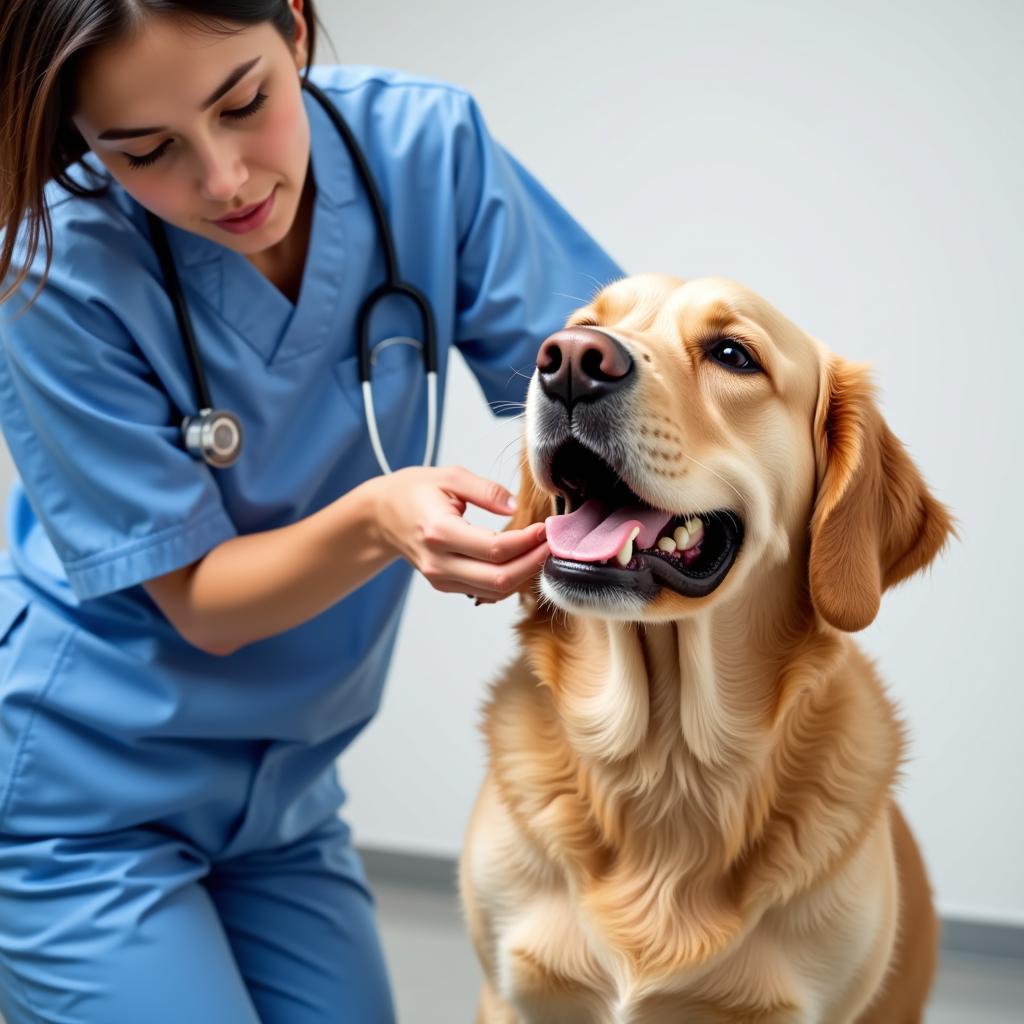Has your dog’s usual bark turned into a raspy whisper? A dog hoarse bark can be concerning for pet parents, but don’t panic. This vocal change often points to simple issues like a little too much playtime barking. However, sometimes, a hoarse bark can signal a more serious underlying condition requiring veterinary attention.
This article will delve into the common causes of dog hoarse bark, how to soothe their strained vocal cords, and when it’s crucial to seek help from a veterinarian.
Decoding Your Dog’s Hoarse Bark
Dogs use their barks for various reasons, from expressing joy to alerting you to potential threats. Just like our voices, their vocal cords can become strained and irritated.
Common Causes of Hoarse Bark in Dogs
Several factors can lead to a hoarse bark in dogs:
- Overuse: Just like us, dogs can strain their vocal cords by barking excessively. This is particularly common in very vocal breeds or dogs who bark frequently at passersby, during play, or when left alone.
- Infections: Upper respiratory infections, like kennel cough, can cause inflammation in the larynx (voice box), resulting in a hoarse bark. Other symptoms, like coughing, sneezing, or discharge from the nose or eyes, might accompany the hoarseness.
- Irritants: Inhaled irritants, such as dust, smoke, pollen, or cleaning products, can irritate the vocal cords and lead to hoarseness.
- Allergies: Similar to irritants, allergies can trigger inflammation in the airway, causing a hoarse bark.
- Medical Conditions: In some cases, a hoarse bark can be a symptom of more serious medical conditions. These include hypothyroidism, paralysis of the larynx, or even tumors in the throat.
Soothing Your Dog’s Strained Voice
If you notice your dog has a hoarse bark, there are several things you can do to help:
- Rest their voice: Encourage your dog to rest their voice by limiting barking triggers. Avoid exciting activities that usually make them vocalize.
- Hydration is key: Ensure your dog has access to fresh, clean water to keep their vocal cords hydrated.
- Humidify the air: A humidifier can add moisture to the air, which can be particularly helpful during dry seasons or in dry climates.
- Honey (in moderation): A teaspoon of honey can help soothe irritated throats. However, consult your veterinarian before offering any home remedies.
When to See Your Veterinarian
While a hoarse bark often resolves independently with rest and home care, it’s essential to consult your veterinarian if:
- Hoarseness persists: If your dog’s bark doesn’t improve after a couple of days of home care, it’s time to see your vet.
- Additional Symptoms: Seek veterinary attention immediately if you observe other symptoms, such as coughing, difficulty breathing, loss of appetite, lethargy, or discharge from the nose or eyes, alongside the hoarse bark. These could indicate a more serious condition requiring immediate medical attention.
- Sudden Onset: A sudden onset of hoarseness, especially if not associated with excessive barking, warrants a veterinary check-up.
 Veterinarian Examining a Dog
Veterinarian Examining a Dog
Preventing Hoarseness in Dogs
You can take a few steps to help prevent your furry friend from developing a hoarse bark:
- Manage barking: If your dog is prone to excessive barking, consider addressing the underlying cause through training or behavioral modification techniques.
- Vaccination: Ensure your dog is up-to-date on their vaccinations, including the kennel cough vaccine, to reduce the risk of infections that can cause hoarseness.
- Minimize exposure to irritants: Avoid using strong-smelling cleaning products around your dog and keep them away from smoke and other potential irritants.
- Address allergies: If you suspect your dog has allergies, work with your veterinarian to identify and manage the allergens.
FAQs: Dog Hoarse Bark
Can stress cause a hoarse bark in dogs?
While stress doesn’t directly cause hoarseness, it can lead to excessive barking, which can, in turn, strain their vocal cords.
Is it normal for a dog’s bark to change with age?
Yes, just like in humans, a dog’s vocal cords can change with age, potentially causing their bark to become raspier or weaker.
Can I give my dog cough drops for their hoarse bark?
No, never give your dog human medications, including cough drops, without consulting your veterinarian. Some human medications can be toxic to dogs.
What if my dog’s bark suddenly disappears?
If your dog’s bark disappears entirely, it’s crucial to consult your veterinarian immediately. This could indicate a serious condition affecting the larynx or other parts of the respiratory system.
Looking for More Advice on Dog Health and Well-being?
For more insightful information on caring for your canine companion, browse through our other helpful articles at Beaut Dogs.
For personalized advice and support, don’t hesitate to reach out to our team at [email protected]. We’re here to help you navigate the wonderful world of dog ownership!
About Beaut Dogs
Beaut Dogs is your one-stop resource for all things dog-related, offering reliable, practical, and in-depth information on the canine world. From breed-specific insights to expert guidance on health, nutrition, training, and more, Beaut Dogs empowers dog lovers to provide the best possible care for their furry companions. Visit https://beautdogs.com today to discover the wonderful world of dogs and learn how to care for them best.